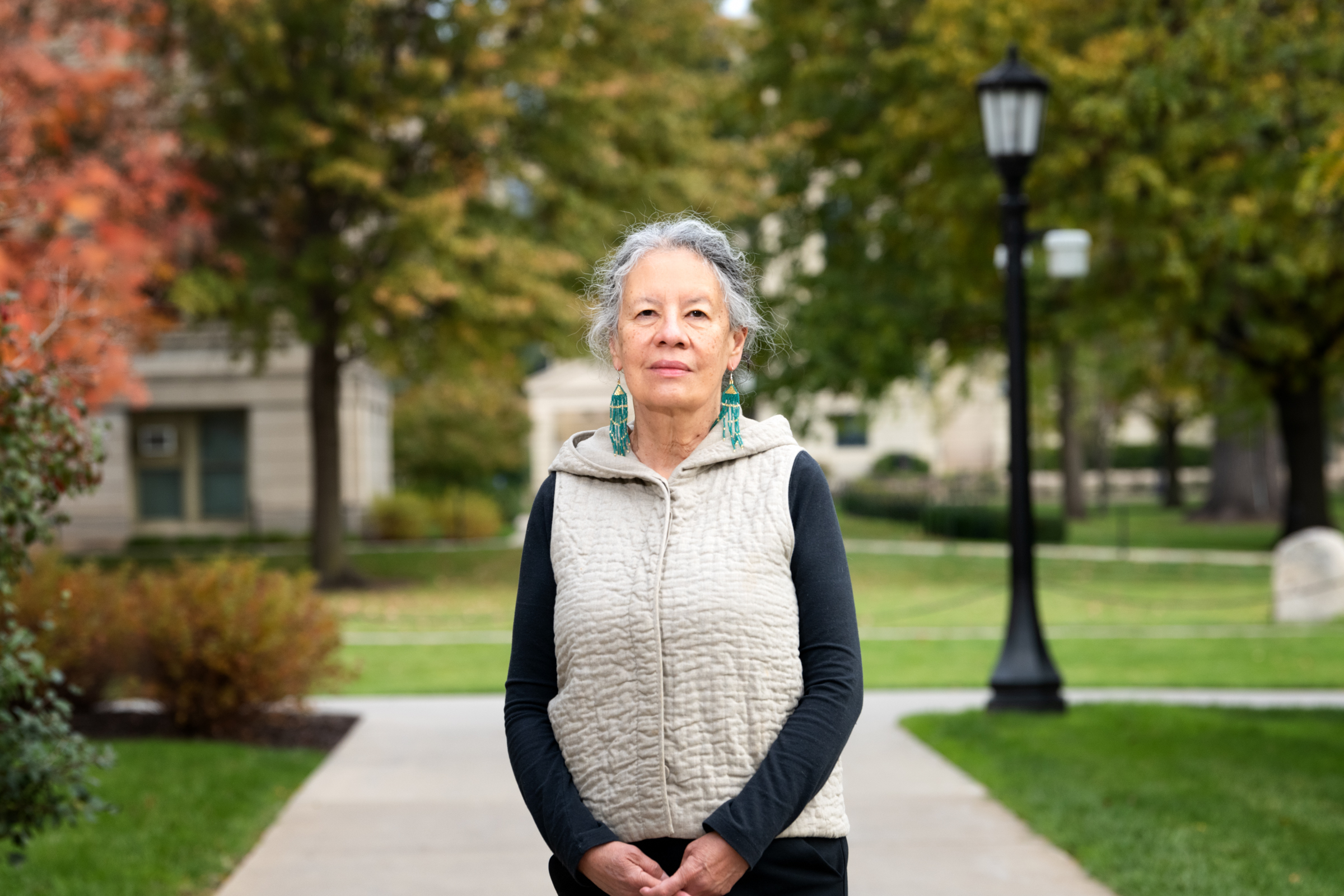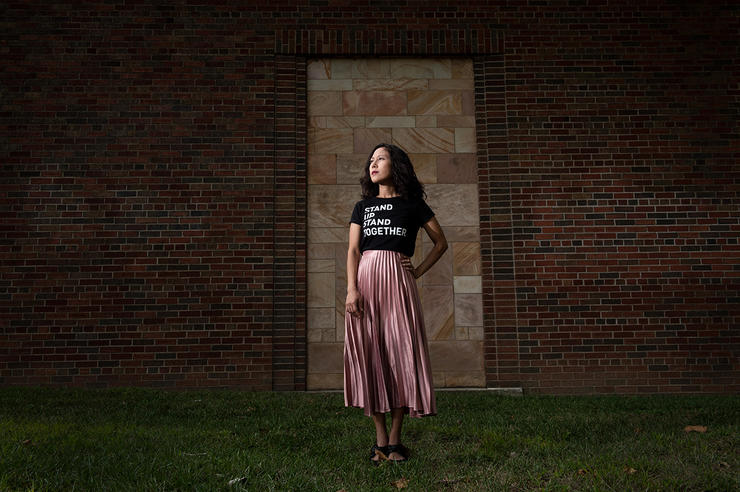Rand’s research, teaching illuminate Native history

The history and experiences of Native Americans have been at the heart of Jacki Rand’s life, teaching, and scholarship.
Rand, associate professor of history at the University of Iowa, is a member of the Choctaw Nation, the daughter of a Choctaw mother. For more than 20 years, she has taught classes at Iowa on indigenous history and Native American federal law and policy, and she has helped students appreciate the indigenous peoples who occupied North America long before white settlers colonized the continent. Before joining Iowa, Rand was a driving, inspirational force in the early planning and fact-gathering phases for the National Museum of the American Indian in Washington, D.C.
“Throughout our history, we have remained sovereign people, and that cannot be taken away,” Rand says. “We’re here because we’re Native people, and we believe in our beliefs, and we’re clearly persistent people. Our population has never fully recovered, but 4.5 million is a significant population. And most of our communities are intact to some degree.”
That’s the positive. But much of Native American history is rooted in a steady stream of injustices, from disregard for original treaties and unlawful collection of Native human remains and cultural artifacts to forcibly corralling Native Americans to slivers of their original lands.
“I think the national narrative is not so much about a city on a hill, a shining beacon to the world,” Rand says. “It’s more like a shining example of the raw exercise of power, the abuse of other peoples, violation of human rights, and lots of deception that has seeped into the courts, the halls of government, and settler societies. History shows us this.”
“Throughout our history, we have remained sovereign people, and that cannot be taken away. We’re here because we’re Native people, and we believe in our beliefs, and we’re clearly persistent people. Our population has never fully recovered, but 4.5 million is a significant population. And, most of our communities are intact to some degree.”
Rand learned about many of these systemic injustices in her personal life, and they stayed with her.
As a young girl in Oklahoma, she witnessed discrimination against her mother, due in part to her Choctaw heritage and her dark skin color. Despite those instances, her mother, whom Rand calls a great storyteller, made sure her daughter connected personally with her roots. Much of this happened when Rand would gather with cousins, aunts, and other family at church or other social gatherings.
“There were just lots of people who looked like my mom,” recalls Rand, whose father was in the Air Force and was stationed for a period at Altus Air Force Base in Oklahoma. “They knew my mom, they sang in Choctaw, we had a lot of Choctaw food, they treated me like a relative. We were running around, not getting into trouble, under the watchful eye of adults who were just letting us play, and they were feeding us all the time. It was just a really lovely period in my childhood for me, and my brother and I never forgot it. That stayed with me. I remain connected to my relatives.”
After graduating with a degree in political science from the University of Maine, Rand headed to Washington, DC, where she worked briefly for the State Department. The internship put her in direct contact with the Smithsonian Institution, and she took a job there. The timing was fortuitous; the Smithsonian had just begun planning for a National Museum of the American Indian (NMAI), and Rand, as one of two Native Americans employed at the Smithsonian, was tapped to be on a committee charged with planning the new museum.
The meetings, however, did not bear much beyond talk, Rand says. She grew frustrated enough to confront the committee chair.
“I told him, ‘Everybody in these meetings are non-Natives, and they don’t know Natives except me, and that’s not sufficient. I mean, I can’t be that person. And no one person can be that person,’” Rand says. “He said, ‘What do you want to do?’
“And, for the first time in my life, I felt like a such a grown-up as I said, ‘Well, I have this proposal for you.’”
Rand proposed leading a group that would travel to Native American communities around the nation, asking tribal members what they wanted in the museum. Rand obtained funding, developed the methodology, and organized the gatherings.
“This work reminds people that Native people are still in the Midwest. They have been removed, and their history has been erased. This research sheds light on them as a community, showing the work they have been doing all along.”
Rand expected the discussions to focus, naturally, on ideas for the NMAI. Instead, she heard story after story about Native Americans’ remains being exhumed and their cultural artifacts taken without their permission by archaeologists and anthropologists—issues that were being addressed concurrently during congressional hearings on Capitol Hill.
“Here I am, a Native person, representing some museum, asking people to trust me, and just starting to understand this history of Native suffering,” Rand says. “I was starting to get it on a much deeper level, and it was horrifying. I was very torn. I couldn’t decide whether I was a good or bad person.”
Rand led the NMAI fact-gathering meetings for four years, ending in 1994. (The museum opened in 2004.) She earned a doctorate in history from the University of Oklahoma in 1998 and that same year joined the Department of History at Iowa with a joint appointment in American Indian and Native Studies.
While Rand teaches a range of classes, she focuses on federal Indian law and policy. That class examines the history of the U.S. government’s relationship with Native Americans—a complicated web of distrust, deceit, and tragedy, she says.
Rand has been working on a digital project called “Indigenous Midwest.” At its core, Rand and her graduate students have partnered with two Native American tribes located in the Midwest, the Meskwaki and the Ioway, to learn about their history and their communities today.
“This work reminds people that Native people are still in the Midwest,” Rand says. “They have been removed, and their history has been erased. This research sheds light on them as a community, showing the work they have been doing all along.”
